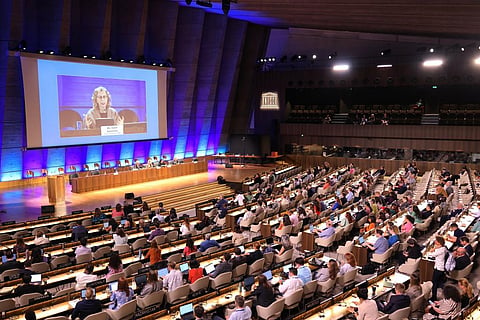

The substantial work on the elements presented in the options paper began late on day three of the ongoing Intergovernmental Negotiating Committee (INC-2) in Paris, France. Contact groups were supposed to start work on discussing the elements on the second day of the meeting organised by the United Nations Environment Programme (UNEP).
The agreement to get to work and discuss the elements of the instrument was not without its share of drama in the plenary. The Chair gaveled and adjourned the meeting without noticing there was a point of order or an objection from Saudi Arabia and India and three other member states were still in line to make interventions.
This was followed by chaos in the plenary, which was called back after an hour of informal discussion between Saudi Arabia and the secretariat. It then heard interventions of countries like Russia, India, Saudi Arabia, Brazil and the United States.
The contact groups went to work after the interventions from these countries.
There are two contact groups that will run parallelly. Contact group-1 will discuss objectives, core obligations, control measures and voluntary approaches. Contact group-2 will handle the implementation measures and means of implementation.
Each contact group will have a total of five sessions and a majority of the discussions (three sessions) will happen on day four or June 1. The last discussion of contact groups will occur on Friday, followed by the talks being taken to the plenary on the last day of the INC-2.
The contact group-1 has started deliberating about the instrument’s objective in the first meeting session. Most member states favoured moving ahead with option A put forth in the options for elements paper by UNEP.
The African group, Argentina, Canada, Colombia, Norway, Philippines, Republic of Korea, Thailand, the United Kingdom and Uruguay are in favour of option A. “End plastic pollution; protect human health and the environment from its adverse effects throughout the life cycle of plastic,” the option read.
Some countries, like Australia, suggested slight modifications to the text of option A.
A handful of member states like Eswatini and New Zealand favoured adding “in the marine environment” to the text that would be finalised. Countries like Mexico and Peru favoured adding “from all sources” to the text that would be adopted and opened for discussion in the plenary.
The ‘no ambition coalition’ countries like Saudi Arabia and Brazil proposed fresh objectives that were not proposed in the options for elements paper. India did not make an intervention proposing fresh objectives.
The contact group-2 has started discussing national action plans. The European Union, in its intervention, made a mention of national implementation plans with timelines in place.
India, in its intervention, said every country is dealing with a different situation and the template for the NAPs should be decided by the member state and not have a common template for all.
Day 4 will start with contact group 1 discussing the Core obligations, control measures and voluntary approaches, while contact group-2 will discuss coordination, capacity building, financial arrangement and technology transfer.